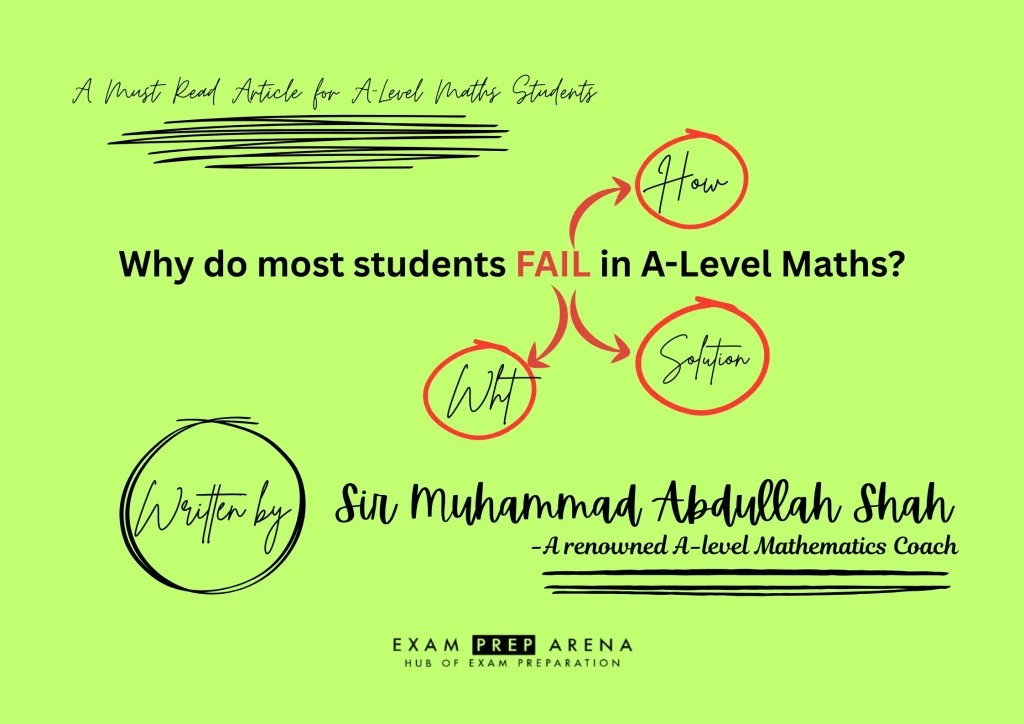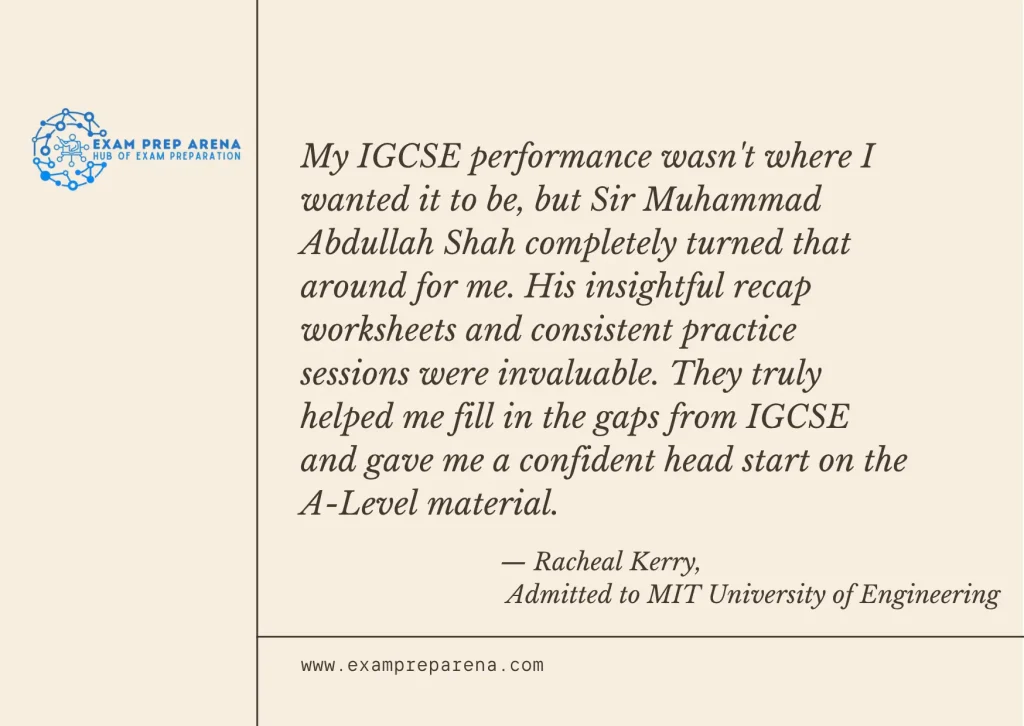
Mathematics at the Edexcel & Cambridge A-Level level is notoriously challenging, and many students struggle to achieve top grades. But why does this happen? Let’s dive deep and explore in the blog, an expert analysis by Sir Muhammad Abdullah Shah – .Founding Principal, Exam Prep Arena.
Why Do Most Students Fail Edexcel, Cambridge IAL Mathematics Exams?
Every year, more than a million candidates appear the International A level Mathematics examination, collectively in Edexcel and Cambridge. Unfortunately, despite having access to online study materials, recommended books, and hard work, nearly 43% of candidates fail to get a grade higher than D. The weak grip on foundational mathematical skills and unawareness of exam techniques is the primary cause of the failure of many candidates. It all starts with a lack of comprehending the core concepts and practice of mathematics questions. For qualifying Edexcel IAL Maths examinations with flying colors, foundational mathematical skills, along with profound conceptual understanding of Calculus and mastery of Trigonometric Identities & problem solving becomes the determining element. Consequently, only a few cross over the main bridge and get a grade higher than C.
Nowadays, Mathematics has become one of the main subjects to get admission in the renowned global universities. Thousands of youngsters join the bandwagon each year, hoping to get into their dream universities. It does, however, need every ounce of effort. Unlike failure, your success is even cherished by the people who once called your journey “worthless and futile.” We often tend to focus on the strategies of successful people, but we fail to acknowledge that their success was somehow created by a failure they might have encountered during their success journey. Moreover, despite learning from heaps of books and notes, many A-Level students seem unsuccessful in identifying the reason behind the failure or their bad grades. There have been multiple reasons which have been haunting thousands for years.
What core characteristics define the inherent difficulty of A-Level mathematics?
A-Level mathematics is inherently difficult due to several core characteristics:
1. Direct Building on Prior Knowledge
A-Level Maths builds directly and extensively on foundational concepts learned at (I)GCSE and IGCSE levels. Unlike other subjects where previous material might be revisited more thoroughly, A-Level Maths often assumes a strong grasp of earlier topics, with teachers potentially skipping initial recap chapters to move quickly into new content due to time constraints. To me, it is like building a giant skyscraper without paying importance to its foundation. Where (I)GCSEs are the foundations; if concepts like quadratic equations, algebraic fractions, or trigonometry (sine, cosine, tangent) are not fully understood from (I)GCSE, students will find the step up to A-Level very challenging. This concept is so fundamental that it’s compared to Isaac Newton’s famous quote, “Standing on the shoulders of giants,” implying that current work builds upon the achievements of those who came before.

2. Emphasis on Problem-Solving Skills
A-Level Maths demands a high level of problem-solving skills, which many students may not have developed sufficiently during their GCSE or IGCSE studies. While GCSE questions are often shorter and broken down into subsections with more guidance, A-Level questions are significantly longer, carry more marks (up to 10 or 15), and provide much less structure and support. This requires students to not only know how to do the maths but also to independently determine the necessary steps to solve a problem. Some schools may not embed rigorous mathematical problem-solving or advanced thinking into their (I)GCSE teaching, focusing instead on drilling techniques for exam success, which can leave students unprepared for the demands of A-Level. A high GCSE grade (e.g., a 9 or an A*/A) does not automatically guarantee readiness, as some students may have achieved these grades through rote learning or last-minute drilling rather than deep understanding and problem-solving ability.
3. Requirement for Extensive Independent Study
Moreover, A-Level Maths necessitates a considerably greater amount of independent study compared to (I)GCSE. Students are expected to spend much more time outside of class on homework, tackle longer exercises, and commit more dedication to mastering complex ideas. The subject requires significant perseverance to achieve top grades. If a student enjoys maths, has a solid GCSE or IGCSE background, and has engaged with maths challenges, they may find this independent study enjoyable. However, for those who struggle or lack motivation, the sheer volume and complexity of the material can make it seem impenetrable, leading to demotivation. The long summer break between (I)GCSE exams (May/June) and the start of A-Level in September can also compound this issue, as students may lose some of their previously acquired knowledge during this period if they don’t engage in some preparatory maths.
What Mathematical Skills are Crucial for getting A* in Cambridge, Edexcel A-Level Mathematics Examination?
To achieve A*/A grades in A-Level Maths more than just regurgitating the textbook is necessary! It needs to be general, and be able to be applied outside the ones you know and are comfortable in thinking about. Below are listed few indispensable math skills for cumulative success at this high level:
-
Outstanding Algebraic Fluency & Manipulation
This is the bread and butter of A-Level Maths. You need to be confident and correct in:
- Solving harder equations and inequalities (linear, quadratic, simultaneous, exponential, logarithmic, trigonometric).
- Simplifying expansions and simplify algebraic fractions, indices, and surds.
- Factorizing and expanding expressions efficiently, such as tricky quadratics and cubics.
- Rearranging multiple variable formulas.
-
Deep Conceptual Understanding of Calculus (Differentiation & Integration)
- A student must not only know the rules, but have a comprehensive understanding of what differentiation (rate of change, slope) and integration (area under curve, accumulation) is, so that he can easily connect with what the question really demands.
- Learning all standard derivatives and integrals: including trigonometric functions, exponential functions, with the chain rule, product rule, and the power rule, as well as standard integrals including trigonometric functions, inverse trig functions, natural log, and exponentials.
- The candidate of Cambridge/Edexcel IAL Maths must be well equipped to apply calculus to solve intricate problems in diverse contexts (kinematics, optimization, rates of change, areas, volumes).
-
Trigonometric Identities & Problem-Solving Mastery
You must have a solid hand on trigonometric identities (including double angle and addition formulae).
- Solving problems involving more complicated trigonometric equations within a given range, often resorting to identities or using graphical representations.
- Trigonometric graph, sketching, and their transformation, are a much-needed skills to surpass the Cambridge/Edexcel IAL Mathematics exam.
-
Logical Reasoning & Proof
A Level Maths (particularly in Pure Mathematics) also places a lot of emphasis on proof for mathematical statements. This skill is in building logically sound, step by step arguments out of definitions, axioms, and previous proven theorems. It requires precision in language and notation.
-
Problem-Solving & Modelling
- Using sequential reasoning, to break down large (long – term) problems into manageable chunks may help the student to easily solve the problems successfully.
- Translation of real world – situation into mathematical models (particularly in Mechanics and Statistics) and reconstruction of the mathematical solutions in the context of the problem is a mighty task but is a crucial element for getting A* or A grade in Cambridge/Edexcel IAL Mathematics.
- It’s about choosing the most appropriate mathematical tools and techniques to solve unfamiliar problems.
-
Graphical Interpretation & Sketching
Around 30 percent of exam every year is composed of questions from graphical portion of curriculum. Therefore, understanding the relationship between equations and their graphs is a must skill that all candidates must develop over the period of practice. Moreover, all functional graphs of particular functions (polynomials, exponentials, logarithms, trigonometric, reciprocal) and transformations are amongst the requirement. Similarly, using graphs to solve equations, inequalities, and visualize solutions or relationships in problems is a helpful tool for students in their A level Maths exam.
To conclude the discussion, Edexcel and Cambridge A level exam preparation demands 6 to 10 months of dedicated study. Therefore, no aspirant can prepare himself in just 1 to 2 months. Whoever gives his preparation serious thought and hard work for at least a year generally gets A grades. Many candidates ask me how your students get A* or OCLA in A level Mathematics exam, and we always tell them the same, “Remember, always be sincere to yourself whenever you start preparation because your parents, friends, and family attach hopes to you” Never let them down with haste because the competition has always been among hardworking students. You must compete with yourself, your nerves, and other competitive aspirants to have a place in the high achievers. And it can only be possible if you believe in yourself have faith in Almighty Allah, and prepare yourself thoroughly by yourself or by joining an expert and experienced teacher. Because in the end, it is always you who attempt the paper, and it is always your Almighty who helps you succeed.


